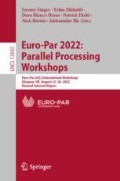Abstract
Here, the IRIS programming model is evaluated as a method to improve performance portability for heterogeneous systems that use LU matrix factorization. LU (lower-upper) factorization is considered one of the most important numerical linear algebra operations used in multiple high-performance computing and scientific applications. IRIS enables the separation of the algorithm’s definition from the tuning by using tasks + dependencies. This considerably reduces the effort required to achieve performance portability on heterogeneous systems. One IRIS code can use different settings depending on the underlying hardware features. Different configurations are evaluated on two different heterogeneous systems to achieve important speedups for the reference code with minimal changes to the source code.
J. Kim—Now at NVIDIA.
Notice: This manuscript has been authored by UT-Battelle, LLC under Contract No. DE-AC05-00OR22725 with the U.S. Department of Energy. The publisher, by accepting the article for publication, acknowledges that the U.S. Government retains a non-exclusive, paid up, irrevocable, world-wide license to publish or reproduce the published form of the manuscript, or allow others to do so, for U.S. Government purposes. The DOE will provide public access to these results in accordance with the DOE Public Access Plan (http://energy.gov/downloads/doe-public-access-plan).
Access this chapter
Tax calculation will be finalised at checkout
Purchases are for personal use only
References
Bellavia, S., Morini, B., Porcelli, M.: New updates of incomplete LU factorizations and applications to large nonlinear systems. Optim. Methods Softw. 29(2), 321–340 (2014). https://doi.org/10.1080/10556788.2012.762517
Eickhoff, K.M., Engl, W.L.: Levelized incomplete LU factorization and its application to large-scale circuit simulation. IEEE Trans. Comput. Aided Des. Integr. Circuits Syst. 14(6), 720–727 (1995). https://doi.org/10.1109/43.387732
Luciani, X., Albera, L.: Joint eigenvalue decomposition of non-defective matrices based on the LU factorization with application to ICA. IEEE Trans. Signal Process. 63(17), 4594–4608 (2015). https://doi.org/10.1109/TSP.2015.2440219
Kudo, S., Nitadori, K., Ina, T., Imamura, T.: Implementation and numerical techniques for one eflop/s HPL-AI benchmark on fugaku. In: 11th IEEE/ACM Workshop on Latest Advances in Scalable Algorithms for Large-Scale Systems, ScalA@SC 2020, Atlanta, GA, USA, 13 November 2020, pp. 69–76. IEEE (2020). https://doi.org/10.1109/ScalA51936.2020.00014
Gan, X., et al.: Customizing the HPL for china accelerator. Sci. China Inf. Sci. 61(4), 042 102:1-042 102:11 (2018). https://doi.org/10.1007/s11432-017-9221-0
Kim, J., Lee, S., Johnston, B., Vetter, J.S.: IRIS: a portable runtime system exploiting multiple heterogeneous programming systems. In: Proceedings of the 25th IEEE High Performance Extreme Computing Conference, ser. HPEC 2021, pp. 1–8 (2021)
Valero-Lara, P., Catalán, S., Martorell, X., Usui, T., Labarta, J.: slass: a fully automatic auto-tuned linear algebra library based on openmp extensions implemented in ompss (lass library). J. Parallel Distributed Comput. 138, 153–171 (2020)
Valero-Lara, P., Catalán, S., Martorell, X., Labarta, J.: BLAS-3 optimized by ompss regions (lass library). In: 27th Euromicro International Conference on Parallel, Distributed and Network-Based Processing, PDP 2019, Pavia, Italy, 13–15 February 2019, pp. 25–32. IEEE (2019)
Dongarra, J.J., et al.: PLASMA: parallel linear algebra software for multicore using openmp. ACM Trans. Math. Softw. 45(2), 16:1-16:35 (2019)
Valero-Lara, P., Martínez-Pérez, I., Sirvent, R., Martorell, X., Peña, A.J.: NVIDIA GPUs scalability to solve multiple (batch) tridiagonal systems implementation of cuThomasBatch. In: Wyrzykowski, R., Dongarra, J., Deelman, E., Karczewski, K. (eds.) PPAM 2017. LNCS, vol. 10777, pp. 243–253. Springer, Cham (2018). https://doi.org/10.1007/978-3-319-78024-5_22
Valero-Lara, P., Martínez-Pérez, I., Sirvent, R., Martorell, X., Peña, A.J.: cuThomasBatch and cuThomasVBatch, CUDA routines to compute batch of tridiagonal systems on NVIDIA GPUs. Concurr. Comput. Pract. Exp. 30(24), e4909 (2018)
Valero-Lara, P., Pinelli, A., Favier, J., Matias, M.P.: Block tridiagonal solvers on heterogeneous architectures. In: IEEE 10th International Symposium on Parallel and Distributed Processing with Applications, ser. ISPA 2012, pp. 609–616 (2012)
Valero-Lara, P., Pinelli, A., Prieto-Matias, M.: Fast finite difference Poisson solvers on heterogeneous architectures. Comput. Phys. Commun. 185(4), 1265–1272 (2014)
Demmel, J.W., Gilbert, J.R., Li, X.S.: An asynchronous parallel supernodal algorithm for sparse gaussian elimination. SIAM J. Matrix Anal. Appl. 20(4), 915–952 (1999)
Trott, C.R., et al.: Kokkos 3: programming model extensions for the exascale era. IEEE Trans. Parallel Distributed Syst. 33(4), 805–817 (2022). https://doi.org/10.1109/TPDS.2021.3097283
Beckingsale, D., Hornung, R.D., Scogland, T., Vargas, A.: Performance portable C++ programming with RAJA. In: Hollingsworth, J.K., Keidar, I. (eds.) Proceedings of the 24th ACM SIGPLAN Symposium on Principles and Practice of Parallel Programming, PPoPP 2019, Washington, DC, USA, 16–20 February 2019, pp. 455–456. ACM (2019)
Valero-Lara, P., Jansson, J.: Heterogeneous CPU+GPU approaches for mesh refinement over lattice-boltzmann simulations. Concurr. Comput. Pract. Exp. 29(7), e3919 (2017)
Valero-Lara, P., Igual, F.D., Prieto-Matías, M., Pinelli, A., Favier, J.: Accelerating fluid-solid simulations (lattice-boltzmann & immersed-boundary) on heterogeneous architectures. J. Comput. Sci. 10, 249–261 (2015)
Valero-Lara, P., Kim, J., Hernandez, O., Vetter, J.S.: Openmp target task: tasking and target offloading on heterogeneous systems. In: Chaves, R., et al. (eds.) Euro-Par 2021. LNCS, vol. 13098, pp. 445–455. Springer, Cham (2021). https://doi.org/10.1007/978-3-031-06156-1_35
Tomov, S., Dongarra, J., Baboulin, M.: Towards dense linear algebra for hybrid GPU accelerated manycore systems. Technical report, 2008-01 (2008)
Author information
Authors and Affiliations
Corresponding author
Editor information
Editors and Affiliations
Rights and permissions
Copyright information
© 2023 The Author(s), under exclusive license to Springer Nature Switzerland AG
About this paper
Cite this paper
Valero-Lara, P., Kim, J., Vetter, J.S. (2023). A Portable and Heterogeneous LU Factorization on IRIS. In: Singer, J., Elkhatib, Y., Blanco Heras, D., Diehl, P., Brown, N., Ilic, A. (eds) Euro-Par 2022: Parallel Processing Workshops. Euro-Par 2022. Lecture Notes in Computer Science, vol 13835. Springer, Cham. https://doi.org/10.1007/978-3-031-31209-0_2
Download citation
DOI: https://doi.org/10.1007/978-3-031-31209-0_2
Published:
Publisher Name: Springer, Cham
Print ISBN: 978-3-031-31208-3
Online ISBN: 978-3-031-31209-0
eBook Packages: Computer ScienceComputer Science (R0)

